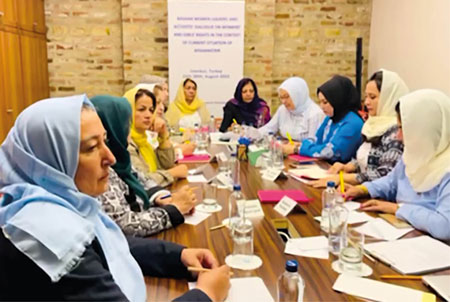At the four-day “Afghan Women Leaders” gathering in Istanbul, Turkey, women’s rights activists from Afghanistan and members of international human rights organizations urged the world countries to support the rights of Afghan women and girls.
They voiced concerns about women’s lack of access to work and education and asked the international community to assist Afghan and international organizations working for women’s rights.
“There should be a detailed investigation mechanism to follow up on the actions of the Taliban. Second, the issue of girls’ education should be invested in for different alternatives for girls’ education and. Third, investments should be made in girls’ employment,” said Rahila Sidiqi, a women’s rights activist.
“If the demands listed here are presented to the world community, international organizations and institutions, and the concerned countries, and this message is also delivered to the Taliban, then women will continue their battles and protests if they are not accepted,” said Soraya Paikan, a women’s rights activist.
Meanwhile, Rina Amiri, the US Special Envoy for Afghan Women, Girls, and Human Rights called on Muslim majority countries to be the loudest voices on women’s rights and human rights in Afghanistan.
In an interview with Okaz/Saudi Gazette, Amiri said it is important for Saudi Arabia to be a leading voice in countering the Islamic Emirate narrative, as the Kingdom is the country that the Muslim world overall looks to.
“I am Muslim. I know from my own experience and from history that Islam is the first religion that gave women their rights. I look to Muslim countries to engage with the Taliban, to challenge that narrative, to engage Afghans, and to say no.”
She said: “Islam is a religion very much aligned with human rights and with women’s rights.”
“The security council should be looking to add more Taliban leaders to the list of people subject to travel bans and to other measures based on their involvement in human rights violations. Second of all, when the human rights council convenes again in September, it should be looking to put in place a new mechanism to greatly enhance the UN’s ability …. to report on and to provide accountability for human rights violations that are happening in Afghanistan right now,” said the associate director of the women’s rights division at Human Rights Watch, Heather Barr.
“Women’s rights in Afghanistan should be protected in a similar way to that of women in other Islamic nations. Schools are open and women are employed in other Islamic nations. We have to get to this point,” said Tariq Farhadi, political analyst.
However, the Islamic Emirate said that the rights of women and girls are respected within the framework of Islamic laws in the country.
“The rights of all women and girls in Afghanistan have been preserved since the Islamic Emirate’s arrival, and the Islamic Emirate is working to address any issues and find solutions to all the problems,” said Bilal Karimi, deputy spokesman of the Islamic Emirate.
Earlier, a number of countries and international organizations called for the observance of human rights, particularly the right to work and the education of women and girls.—Tolonews










